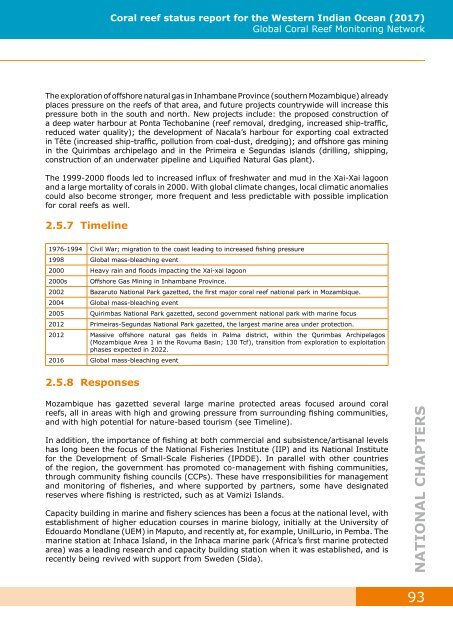GCRMN_COI_2017-Western Indian Ocean Reef Status
GCRMN Western Indian Ocean Coral Reef Status report for 2017. Produced by the Indian Ocean Commission and CORDIO East Africa
GCRMN Western Indian Ocean Coral Reef Status report for 2017. Produced by the Indian Ocean Commission and CORDIO East Africa
You also want an ePaper? Increase the reach of your titles
YUMPU automatically turns print PDFs into web optimized ePapers that Google loves.
Coral reef status report for the <strong>Western</strong> <strong>Indian</strong> <strong>Ocean</strong> (<strong>2017</strong>)<br />
Global Coral <strong>Reef</strong> Monitoring Network<br />
The exploration of offshore natural gas in Inhambane Province (southern Mozambique) already<br />
places pressure on the reefs of that area, and future projects countrywide will increase this<br />
pressure both in the south and north. New projects include: the proposed construction of<br />
a deep water harbour at Ponta Techobanine (reef removal, dredging, increased ship-traffic,<br />
reduced water quality); the development of Nacala’s harbour for exporting coal extracted<br />
in Tête (increased ship-traffic, pollution from coal-dust, dredging); and offshore gas mining<br />
in the Quirimbas archipelago and in the Primeira e Segundas islands (drilling, shipping,<br />
construction of an underwater pipeline and Liquified Natural Gas plant).<br />
The 1999-2000 floods led to increased influx of freshwater and mud in the Xai-Xai lagoon<br />
and a large mortality of corals in 2000. With global climate changes, local climatic anomalies<br />
could also become stronger, more frequent and less predictable with possible implication<br />
for coral reefs as well.<br />
2.5.7 Timeline<br />
1976-1994 Civil War; migration to the coast leading to increased fishing pressure<br />
1998 Global mass-bleaching event<br />
2000 Heavy rain and floods impacting the Xai-xai lagoon<br />
2000s Offshore Gas Mining in Inhambane Province.<br />
2002 Bazaruto National Park gazetted, the first major coral reef national park in Mozambique.<br />
2004 Global mass-bleaching event<br />
2005 Quirimbas National Park gazetted, second government national park with marine focus<br />
2012 Primeiras-Segundas National Park gazetted, the largest marine area under protection.<br />
2012 Massive offshore natural gas fields in Palma district, within the Qurimbas Archipelagos<br />
(Mozambique Area 1 in the Rovuma Basin; 130 Tcf), transition from exploration to exploitation<br />
phases expected in 2022.<br />
2016 Global mass-bleaching event<br />
2.5.8 Responses<br />
Mozambique has gazetted several large marine protected areas focused around coral<br />
reefs, all in areas with high and growing pressure from surrounding fishing communities,<br />
and with high potential for nature-based tourism (see Timeline).<br />
In addition, the importance of fishing at both commercial and subsistence/artisanal levels<br />
has long been the focus of the National Fisheries Institute (IIP) and its National Institute<br />
for the Development of Small-Scale Fisheries (IPDDE). In parallel with other countries<br />
of the region, the government has promoted co-management with fishing communities,<br />
through community fishing councils (CCPs). These have rresponsibilities for management<br />
and monitoring of fisheries, and where supported by partners, some have designated<br />
reserves where fishing is restricted, such as at Vamizi Islands.<br />
Capacity building in marine and fishery sciences has been a focus at the national level, with<br />
establishment of higher education courses in marine biology, initially at the University of<br />
Edouardo Mondlane (UEM) in Maputo, and recently at, for example, UnilLurio, in Pemba. The<br />
marine station at Inhaca Island, in the Inhaca marine park (Africa’s first marine protected<br />
area) was a leading research and capacity building station when it was established, and is<br />
recently being revived with support from Sweden (Sida).<br />
NATIONAL CHAPTERS<br />
93


















